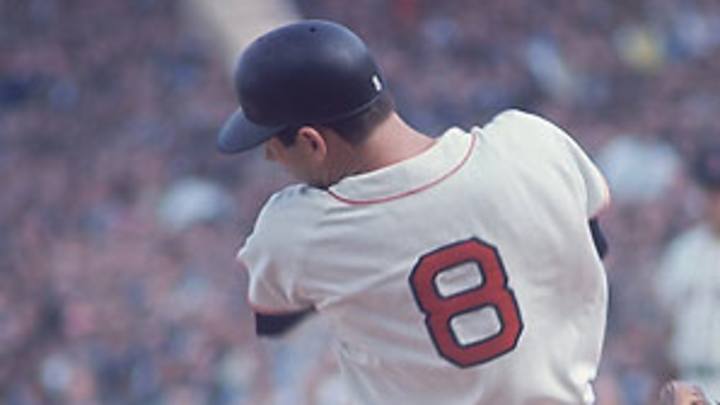Why I owe my life to Fenway Park

I wouldn't exist if not for Fenway Park.
My parents met in college because of baseball. My mother's younger brother, Dan, used to deliver the Boston Herald back when games weren't always on television and scores weren't always so readily available each morning. My father, Robert, smartly sat next to my mother, Susan, in Merrimack College's French 2 class in hopes of finding out whether the Red Sox won or lost the previous night.
They soon hit it off and went on their first date to Fenway: grandstand seats during the Impossible Dream season of 1967.
Not that there was anything impossible about the game they saw, a 5-4 May 12 loss to the Tigers that dropped the Red Sox' record to 11-13. The game itself was so forgettable -- or, perhaps, the company so unforgettable -- that their only recollections of the game were spartan details: a loss, Friday night, cold, May.
Fenway Park, which hosts its 100th anniversary celebration tomorrow, is now a modern antique. Nearly lost a decade ago when new Red Sox ownership groups considered building a new park with greater revenue-generating prowess, it was saved when the bid from John Henry, Tom Werner and Larry Lucchino prevailed.
Instead of scrapping the cozy neighborhood ballpark -- its red-brick façade at the corner of Brookline Ave and Yawkey Way is so nondescript that one could walk past it without noticing -- they reinvested in it, making peripheral improvements that allowed the club to remain financially competitive (and then some) while not detracting from the original feel.
(Even if the cramped wooden rows were built with the man of 1912 in mind and not, ahem, someone who must fold his 6'4" frame into the seat, his knees inevitably pressed up against the hard seatback.)
Baseball has long been celebrated for its generational appeal, and in relics such as Fenway and Wrigley, one can wax nostalgic about watching games on the same ballfield where my parents went on their first date and in front of the same 37-foot-tall wall in leftfield off which my grandfather short-hopped a double in a Catholic Youth Organization state championship game.
My grandfather, a star shortstop at nearby Lowell High, had attracted the attention of Boston-area scouts from the Red Sox and Braves before he enlisted to serve in World War II. Shrapnel wounds earned him the Purple Heart but ended his baseball career. He had no regrets -- my grandfather believed God-Family-Country was the hierarchy to live by -- and never lost his love for the sport, which he passed along to my father.
It was only fitting, therefore, that my first major league game would include a trip to Fenway. My family, living in Virginia at the time, took what I fondly call the Great Baseball Vacation. My parents took my older brother, Jon, and me on a long road trip, making stops at the Baseball Hall of Fame in Cooperstown, as well as games at first Boston's Fenway Park and later Baltimore's Memorial Stadium.
I was four-and-a-half when I entered Fenway for the first time on Aug. 23, 1987, so I mostly remember scattered facts and images, just as most of my memories before the age of five are mental photographs -- more still frames than video remembrances with action and dialogue.
My primary recollection from that first game is a color. That first sensation when emerging from the concourse tunnel into Fenway Park, a sensory rush that has never changed, is to be bombarded by an overwhelming vista of green. From the pristine grass to the walls surrounding the field, especially that oversized Green Monster in left, the color green dominates the experience, a fitting reminder of spring and summer, those long-sought-for seasons after a cold New England winter.
For my first Fenway game, my uncle Gerry had scored second-row seats by the visiting third-base dugout for an afternoon game against the Twins. The close proximity made Minnesota's Kirby Puckett and Kent Hrbek look larger than life.
I know the Red Sox won that day, though I had to look up the score (it was 6-4). I know Don Baylor hit a grand slam and that Dwight Evans hit a home run, though I had long ago forgotten that they were back-to-back shots and that Baylor's came off future Hall of Famer Steve Carlton.
Memory's details may fade with time, though they're forever captured in the boxscores that brought my mother and father together. As Fenway commemorates its 100th anniversary this year, so too do my parents celebrate their 42nd. Happy anniversary to all.

Staff Writer, Sports Illustrated Staff writer Joe Lemire is in his seventh year at Sports Illustrated and his fourth season covering baseball full time. Lemire writes features and analysis for SI and SI.com and is responsible for the website's weekly MLB Power Rankings. He has profiled Pirates star Andrew McCutchen and Braves rookie sensation Evan Gattis for the magazine. Lemire's penchant for covering America's pastime is to be expected considering his inspirations, Tom Verducci and Peter Gammons, are among the most well-known writers in the sport. Before his current role, Lemire spent his first three years with SI oscillating between baseball, college basketball, high school football and sports business. This came on the heels of a summer internship with the magazine in 2004 and a tenure as a stringer with SI: On Campus. Born in Richmond, Va., and raised in Lowell, Mass., Lemire graduated from the University of Virginia in 2005 with a B.A. in government and a minor in economics. Before joining SI he covered high school and college sports for the Daily News-Record in Harrisonburg, Va. He earned two Virginia Press Association awards for his work, one while a student writing at University of Virginia's Cavalier Daily and one at the Daily News-Record.